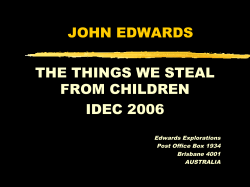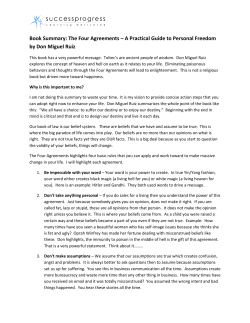
What is Critical Reflection?
Centre for Open Learning and Educational Support What is Critical Reflection? Critical reflection occurs when we analyze and challenge the validity of our presuppositions and assess the appropriateness of our knowledge, understanding and beliefs given our present contexts (Mezirow, 1990). Brookfield (1990) explains that critical reflection involves three phases: 1. Identifying the assumptions (“those taken-for-granted ideas, commonsense beliefs, and selfevident rules of thumb” (pg. 177)) that underlie our thoughts and actions; 2. Assessing and scrutinizing the validity of these assumptions in terms of how they relate to our ‘real-life’ experiences and our present context(s); 3. Transforming these assumptions to become more inclusive and integrative, and using this newly-formed knowledge to more appropriately inform our future actions and practices. The process of critical reflection may be conceptualized through the descriptions and questions contained in the following two figures (adapted from Brookfield 1990, 1995; Mezirow, 1990). Descriptive • Describes situation and general reaction with little attempt to uncover personal assumptions/beliefs about the situation What? Analytical • Integrates meaningful reaction to situation based on assumptions/beliefs, feelings, and alternative perspectives/points of view Why? What if? Critical Now What? • Uncovers the root causes of our knowledge, assumptions and beliefs. Discovers new meaning and suggests how this experience can impact and inform the future | Prepared by Natasha Kenny, 2010 1 Centre for Open Learning and Educational Support What happened (describe the experience)? What will you do as a result of this experience? How will you use it to inform your future? Why /how did it happen? What factors contributed? How do you feel about it? What is your new interpretation of the experience? What is the significance? What did you learn about yourself and others? References: Brookfield, S.D. 1995. Becoming a Critically Reflective Teacher. Jossey-Bass, CA. Brookfield, S.D. 1990. Using critical incidents to explore learners’ assumptions. In pages 177-193 of J. Mezirow (Ed). Fostering Critical Reflection in Adulthood. Jossey-Bass Publishers, San Fransisco. Mezirow, J. 1990. How critical reflection triggers transformative learning. In pages 1-20 of J. Mezirow (Ed). Fostering Critical Reflection in Adulthood. Jossey-Bass Publishers, San Fransisco. | Prepared by Natasha Kenny, 2010 2
© Copyright 2025





















